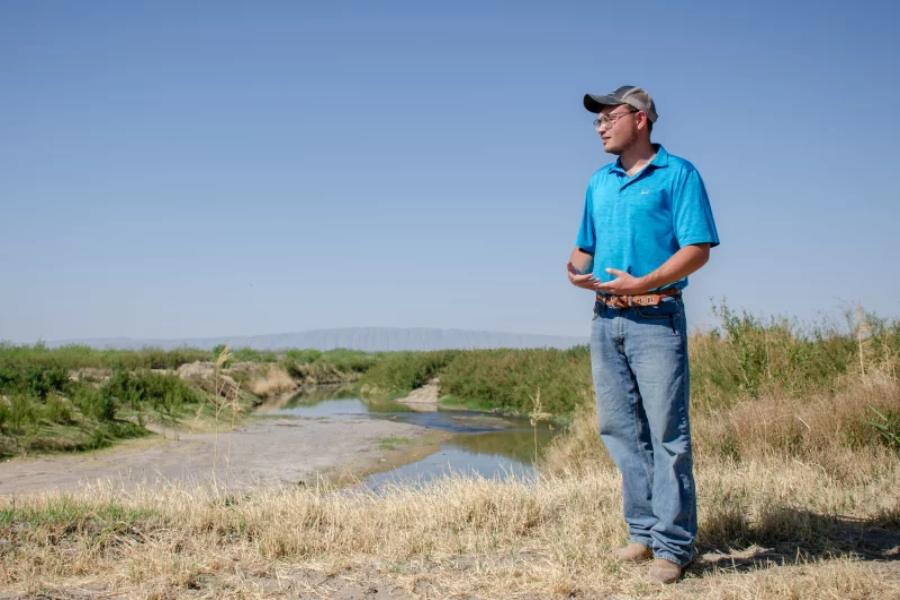Farmers in Far West Texas’s parched fields are battling a deepening water crisis that threatens their crops, livelihoods, and the region’s agricultural legacy. Mexico’s struggle to uphold its decades-old commitment under the 1944 U.S.-Mexico Water Treaty is at the heart of the issue, leaving Texas farmers to reckon with dry riverbeds and uncertain harvests.
Most of the water that sustains these lands comes from the Rio Grande, which is significantly replenished by Mexico’s Rio Conchos replenish. Nowhere is this more evident than in La Junta de los Rios, where the two rivers meet and support what is believed to be the oldest continually cultivated farmland in Texas.
“This land has been farmed for thousands of years, even before Christ was born,” said Chris Bell, a newcomer to farming in Presidio. “This whole valley’s just been rich forever. It keeps everyone alive.” Bell moved to the region hoping to revive its once-thriving agricultural economy with crops like alfalfa and turfgrass. However, unpredictable water flows and aging infrastructure have made farming an uphill battle. “It’s just been hard on everybody to get enough water,” Bell said. “It’s not raining much, and many things have changed.”
Mexico has historically struggled to fulfill its water obligations to the U.S. under the treaty, leaving farmers on this border with devastating shortfalls. Estimates suggest that Texas agriculture has lost hundreds of millions of dollars in the past decade alone due to water deficits. With only about 30 percent of its treaty obligations met and the current cycle ending in October, the situation has grown increasingly urgent.
In recent years, former President Trump attempted to force Mexico to deliver water by threatening tariffs and denying a Mexican request for water, something the U.S. had never done before in the treaty’s 81-year history. While the move highlighted Washington’s frustration, experts say threats alone can’t produce water that doesn’t exist.
Rosario Sanchez, a senior research scientist at the Texas Water Resources Institute at Texas A&M University, said the state is looking for predictability and reliability—something Mexico hasn’t consistently delivered in the past 15 years. “We’re basically broke,” she said. “You can impose anything you want, but that’s not going to create water,” Sanchez emphasized that the crisis is not confined to one side of the border. “It’s everybody’s problem,” she said.
In April, Mexican President Claudia Sheinbaum pledged that Mexico would begin immediate water deliveries, fulfilling treaty requirements rather than bowing to political pressure. Farmers like Valentin Sanchez, who grows alfalfa in Presidio, welcomed the news but remained skeptical. “It’s just a temporary solution,” he said in Spanish. “Maybe it’ll last a month, two months. After that, the water will run out all over again.” He warned that the drought’s impact extends beyond the border, threatening crops across the state. Last year, Texas’s last sugar mill shut down, a victim of the ongoing water dispute. The citrus industry in South Texas could soon face the same fate.
“If things don’t improve,” Valentin Sanchez said, “I might have to leave the fields I’ve known my whole life.”
The water shortage threatens crops, as well as the economic stability and cultural heritage of regions like Presidio. The Rio Grande, once a steady lifeline, has become a symbol of scarcity and tension. The U.S. and Mexico are expected to meet this summer, just months before the treaty’s October deadline, to assess water deposits and rainfall and evaluate whether recent efforts will be enough to meet obligations.
As farmers like Bell and Sanchez continue to plant, hope, and wait, they reflect a community determined to endure, even as solutions remain elusive. “This isn’t just Texas’s problem or Mexico’s problem,” Rosario Sanchez said. “It’s everybody’s problem. And it’s going to take everybody working together to fix it.”
For now, the fields of Presidio await the next rainfall—and the subsequent decision from policymakers on both sides of the Rio Grande.
